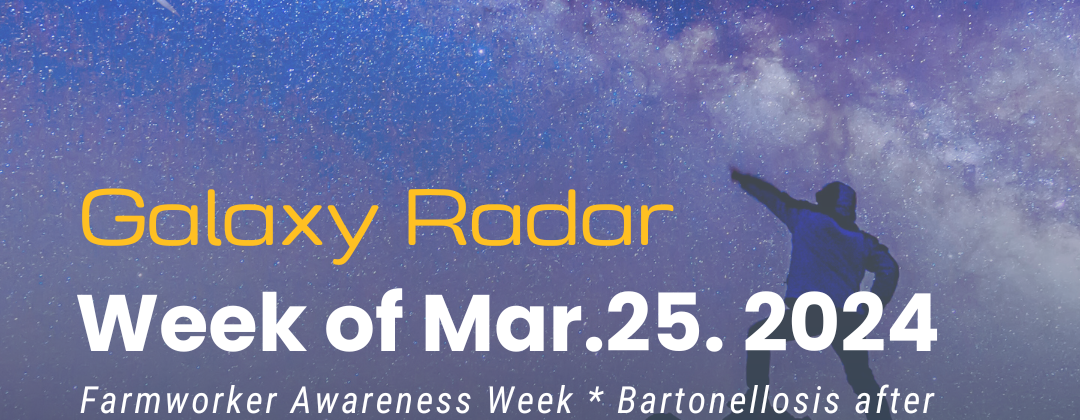HEADLINES: Farmworker Awareness Week * Bartonellosis after COVID-19 * Review of Bartonella Findings in the Mediterranean Region * More
Farmworker Awareness Week
Agricultural workers, like others who work outdoors and live and work with animals, are at increased occupational risk of zoonotic disease. Find out more about the risk and NIOSH recommendations from our 2019 post for Lyme Disease Awareness Month.
Bartonellosis after COVID-19
Unmasking Bartonella henselae Infection in the Shadows of Long COVID Thanks to Clinical Metagenomics by A Aubry et al. publishing from Hôpital Saint-Louis, Paris – Five months after having COVID-19, a woman still had symptoms including swollen axillary lymph nodes (lymph nodes under the arm). Metagenomic analysis of a biopsy found Bartonella henselae. Antibiotics improved her symptoms. Moving beyond the “one pathogen one disease” model finds pathogens combining in ways that may be unique from the sum of their parts. The case authors suggest considering bartonellosis when there are swollen lymph nodes.
Review of Bartonella Findings in the Mediterranean Region
Geographical Distribution of Bartonella spp in the Countries of the WHO Eastern Mediterranean Region (WHO-EMRO) by ZT Ashtiani et al. publishing from the Pasteur Institute of Iran – In publications from the nations of the WHO Eastern Mediterranean Region, 18 species of Bartonella have been found, including nine known human pathogens. While the bacteria are generally found in the same vector and host species, there are suggestions of genetic histories. For example, candidatus Bartonella merieuxii is closely related to B. bovis, a species found in ruminants, but this species has been found in dogs in four nations.
MORE: New Bartonella Findings in Animals * New Borrelia Findings in Animals * New Serology Target for Borrelia * Conference: RESI South 2024 * Galaxy Diagnostics Is Closed Friday
The genera Bartonella and Borrelia include niche species found in vectors and hosts around the world. Researchers investigating genetic diversity release a steady stream of publications on newly identified species and strains. As humans move into new natural habitats and animals and vectors shift their ranges, or as new species become popular in the pet, new opportunities for human infection arise. Because of this emerging risk, seemingly unimportant animal observations can rapidly identify risks to human health.
New Bartonella Findings in Animals
Eutrichophilus cordiceps Mjöberg, 1910 (Ischnocera: Trichodectidae) in Spiny Tree Porcupines (Coendou villosus): New locality records and the first molecular evidence of association with Bartonella spp by R Bassini-Silva et al., a team of researchers publishing from Brazil and Chile – Researchers found E. cordiceps, a chewing louse, in a São Paul State for the first time, and in Santa Catarina State for only the second time. They also found a Bartonella species in the louse for the first time.
Genetic Diversity of Bartonella rpoB haplotypes in Domestic Cats from Chile by P Sepúlveda-García et al. publishing from Chile, the Netherlands, Brazil and Saint Kitts and Nevis – Tests on domestic cats in Chile found 29 haplotypes (genetics indicate shared family lineage) of B. henselae and four haplotypes of B. koehlerae. Additionally, a cat was co-infected with both B. henselae and B. koehlerae. While these genetic families may not have any meaningful differences, monitoring by a variety of researchers around the world helps track the genetic diversity that makes up genus Bartonella.
Bartonella in Bat Flies from the Egyptian Fruit Bat in the Middle East by E Špitalská et al. publishing from Slovakia and the Czech Republic – The Egyptian fruit bat is found around the world. A study of bat flies collected from the bats in a variety of regions in the Middle East found a novel Bartonella species and strains of Bartonella as diverse as the populations of the bats.
Molecular Evidence of Bartonella spp. in Tropical Wild Birds from the Brazilian Pantanal, the Largest Wetland in South America by ASA Córdova et al. publishing from Universidade Estadual “Júlio de Mesquita Filho,” São Paulo and Drexel University, Philadelphia – A study of wild birds from the Brazilian Pantanal found 3.8% positive for #Bartonella henselae, B. machadoae or similar genetic matches.
New Borrelia Findings in Animals
Experimental Transmission of a Novel Relapsing Fever Group Borrelia harbored by Ornithodoros octodontus (Ixodida: Argasidae) in Chile by A Santodomingo et al. publishing from Universidad de Concepción – Researchers studied Candidatus Borrelia octodonta by infecting two guinea pigs. The guinea pigs tested positive by PCR, but bacteria were perhaps in very low numbers and not found, suggesting this species of Borrelia may not be a good match to guinea pigs as a host. O. degus, a charming little rodent with increasing popularity in the pet trade, may be the host species.
Antigenicity and Immunogenicity of Different Morphological Forms of Borrelia burgdorferi sensu lato Spirochetes by K Sloupenska et al. publishing from the Czech Republic – The bacteria that cause Lyme disease are capable of existing in several forms, perhaps contributing to chronic disease. A study in mice found that the forms infecting them impacted how they responded to vaccination. This raises questions as to whether different forms of the bacteria may be associated with immune responses that cause autoimmune disease and other differences in disease course.
New Serology Target for Borrelia
Borrelia miyamotoi BipA-like Protein, BipM, Is a Candidate Serodiagnostic Antigen Distinguishing between Lyme Disease and Relapsing Fever Borrelia Infections, by KS Brandt et al. publishing from the US CDC – The researchers identified a serology target that may allow for B. miyamotoi-specific serology. The genetic insights about this target also provide an opportunity for serology that identifies Lyme disease versus relapsing fever Borrelia species.
Conference: RESI South 2024
RESI South 2024 – Galaxy Diagnostics was one of 44 companies that pitched at RESI South in Atlanta this week. This is the first RESI event presented by Life Science Nation to connect global investors and potential partners with early-stage healthcare startups. Many thanks to NC Life Science Organization for making it happen!

Closed Friday, March 29th
Galaxy Diagnostics is closed Friday, March 29th. The lab will reopen Monday, April 1st.




